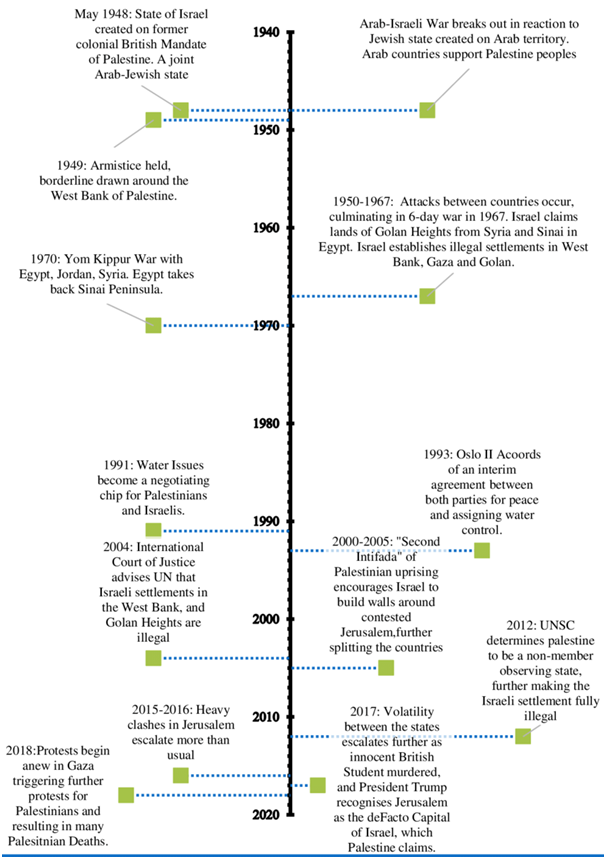Israel- Palestine Conflict and UNGA Resolution
Context: Recently a resolution was passed by the United Nations General Assembly (UNGA) that asked the International Court of Justice (ICJ), to render its opinion on the legal consequences of Israel’s prolonged occupation of Palestinian land.
What is the conflict?
- The roots of the conflict lie in the late 19th century when Jews were fleeing from Russia and central Europe due to anti-Semitism and began emigrating to Palestine.
- The British captured Palestine from the Ottomans during world war 1 in 1917 and promised the Jews a national home. It was called the Balfour
- Palestinians opposed the move at a congress in Jerusalem in 1919.
- In 1947, Palestine was partitioned into Jewish and Arab states under United Nations Resolution 181, City Of Jerusalem was put under international control.
- In the split, the West Bank including east Jerusalem went to Jordan and the Gaza Strip to Egypt.
- Israel was finally created in 1948, provoking an 8-month war with Arab states.
- Israeli forces razed more than 400 Palestinian villages and around 760,000 Palestinian refugees fled to the West Bank, Gaza and neighbouring Arab countries.
Six-day war and annexation of West Bank
- The Six-Day War was held in June 1967. In this war Israel defeated Egypt, Jordan and Syria and occupied east Jerusalem, the West Bank, the Gaza Strip and the Golan Heights.
- This led to Jewish settlement in the occupied territories and continues till now in the West Bank, east Jerusalem and the Golan Heights.
Can the resolution impact the situation?
- UN General Assembly resolutions are not binding on its members and ICJ’s rulings are also not binding.
- The International court of Justice has no power to enforce its directives.
- Even before this resolution, not a single resolution adopted against Israel condemning its continued occupation had any impact on the status quo in the region.
India’s Stand on the Issue?
- In 1948, India voted against the UN partition plan of Palestine in the General Assembly which led to the creation of Israel.
- India sponsored the draft resolution on the right of the Palestinians to self-determination at the 53rd UN Session.
- In the 1967 and 1973 wars, India sided Palestine and lashed out at Israel as the aggressor.
- In the 1970s, India openly supported the Palestine Liberation Organisation and its leader Yasser Arafat as the sole and legitimate representative of the Palestinian people.
- Even though India established diplomatic relations with Israel in 1992, Four years later , India opened a Representative Office in Gaza, which later moved to Ramallah as the Palestinian movement split between the Hamas (which gained control of Gaza) and the PLO.
- The Indian regime remained firmly on the side of the PLO and accepted the two-state solution.
Change in Stand and the balancing Act
- With the arrival of the 21st century, the relationship between India and Israel improved but India kept its stand on Palestine intact.
- The equilibrium started to bend from 2014 when India considerably improved its relationship with Israel.
- PLO leader Mahmoud Abbas visited India in 2017 and it became the occasion for New Delhi to signal the substantive shift.
- Until then, India had always included a line in support of East Jerusalem as the capital of a Palestinian state but this time reference to East Jerusalem was missing.
- But at the Same time India is not completely abandoning Palestine cause which was evident at the UNHRC’s 46th session at Geneva in 2021.
- India voted against Israel in three resolutions – right of self-determination of the Palestinian people, a second on Israeli settlement policy, and a third on the human rights situation in the Golan Heights.
| Two State Solution
The term two-state solution is a proposed framework for resolving the Israeli-Palestinian conflict by establishing two states: ● Israel for the Jewish people and ● Palestine for the Palestinian people. |
| Practice Question
1. Briefly describe the Israel-Palestine Conflict. Evaluate India Foreign Policy on the issue? |





